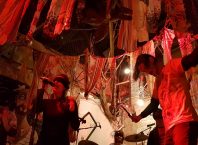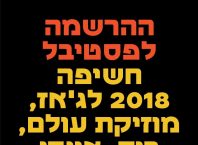The International Writer’s Festival at Mishkenot Sha’ananim Jerusalem opened last night in the presence of President Shimon Peres.
The opening ceremonies were preceded by a press meeting with several of the participating writers. Uri Dromi, General Director of Mishkenot Sha’ananim encouraged an unofficial, open, friendly dialogue, but in the first moments it seemed that the journalists were somewhat awed in the presence of the stellar group of writers assembled onstage. The conversation started with a question that most first time visitors to Israel can expect to hear: Did you have any hesitation before coming to Israel?
Russell Banks (USA) did not hesitate to reply in the affirmative, explaining that he did “hesitate briefly” due to questions raised by friends, due in part to his “stated opposition to policies of the Israeli government.” Banks explained that his decision to participate was based in part on the view that as someone who had opposed the policies of the Bush administration in the US, he feels it would have been “counterproductive if an Israeli writer refused to come to the US” and with his presence hopes to “express solidarity with those who oppose Israeli government policies.”
The writers were all very warm and witty despite their jet lag. Asked about their first impressions, Paolo Giordano (Italy) replied, “I’ve just arrived. I cannot even give you clichés.” As for expectations, Siri Hustvedt (USA) commented that “expectations are a repetition of a known quantity” and as this is her first experience in Jerusalem as a participant in the writer’s festival, she has none. Hustvedt said that in these contexts the “potential dialogues are the best thing that happens” there is often a “phrase, sentence or idea that becomes a brain tattoo. This is what I hope to take.”
The writers were asked to comment on the transition from writing to speaking that is part of participating in festivals and conferences. Paul Auster (USA) said that such a question is “significant, because people become writers because they can’t talk,” yet assured the listeners that most writers can “speak adequately about things that concern them deeply.” Lilliana Heker (Argentina) demonstrated her translation skills as well as improvisation, addressing the group in English, saying, “When you write, you search your words. If you are a writer, you love words. In English, words don’t come to me; I will be half of myself. Some writers speak as they write. I met Borges (Jorge Luis Borges, Argentina, 1899 – 1986). When he spoke, he constructed phrases the same way as he wrote. He was perfect.”
Giordano added that “You can feel intensity from a writer…maybe in the way they don’t say.” Jamaica Kincaid (USA) joined the conversation, saying, “A lot of people say that I write the way I speak. I don’t think of it as different.”
Asked how he selected the authors to invite, Dromi had a ready answer: “Alphabetically.” As for the question of addressing “big themes,” Midnight East likes Heker’s reponse: “I’m not sure that big ideas always make good literature.”
Once everyone was comfortable, IBA (Israel Broadcasting Authority) culture correspondent Dana Herman asked the big question: “Electronic books – are they a blessing or a curse?”
“I have my Kindle with me,” said Banks, “I never leave home without it. I’m not threatened by digitization. This is a moment in the history of story, and of course, content will be altered.” Comparing the shift to other moments in history, such as the transition from wet clay and stylus to papyrus, Banks added that he expects a democratization of the process as well as loss of quality control.
Nicole Krauss (USA) commented that she senses the disappearance of “slowness, reflection, the opportunity to meditate on things,” saying that the process of reading itself has been transformed. “While reading Proust you can shop on Amazon and get those sneakers you wanted. What kind of focus does that allow? Will there still be readers for the kind of books we want to write?”
Auster, does not have a computer, relying instead on “a fountain pen and an old typewriter” yet said, “I’m for it [digital books].” Yet he does not want to see “what happened to the record industry happen to publishing, with writers becoming their own publishers.”
“People talk about it as if it involves changing the instrument,” said Jonathan Safran-Foer, “but it is changing the environment. It’s like the difference between hearing a concert in a room like this or a shopping mall.” Not surprisingly, Safran shares concerns similar to Krauss, expressing his fear that the “space of the [reading] experience will be invaded.”
Daniel Kehlmann (Germany) raised the specter of illegal downloading which has affected the music industry saying that digitization may ultimately “profoundly change what a writer is and how he can support himself.” Kincaid agreed with his prediction saying, “I’m fearful I won’t be able to wear my nice shoes (very nice, turquoise blue loafers – looked comfortable for walking too!), I won’t be able to afford them.” She recalled, “I remember when I first started to write I had no idea I would make money at it.” Kincaid addressed her fellow writers, “How many Corinthians read Paul? Practically none…Pretend you’re Paul.” Auster replied with a smile, “I don’t have to pretend.”
Midnight East looks forward to further dialogue in the days to come. The spirit of intercultural exchange was also expressed in yesterday’s naming of the Mishkenot Sha’ananim Plaza in honor of the Spanish monarchs King Juan Carlos I and Queen Sophia, in the presence of the Spanish Ambassador to Israel, Mr. Alvaro Iranzo, Spanish Minister of Culture, Mrs. Angeles Gonzales Sind Reig and Spanish guest writer, Mr. Adolfo Garica Ortega.






